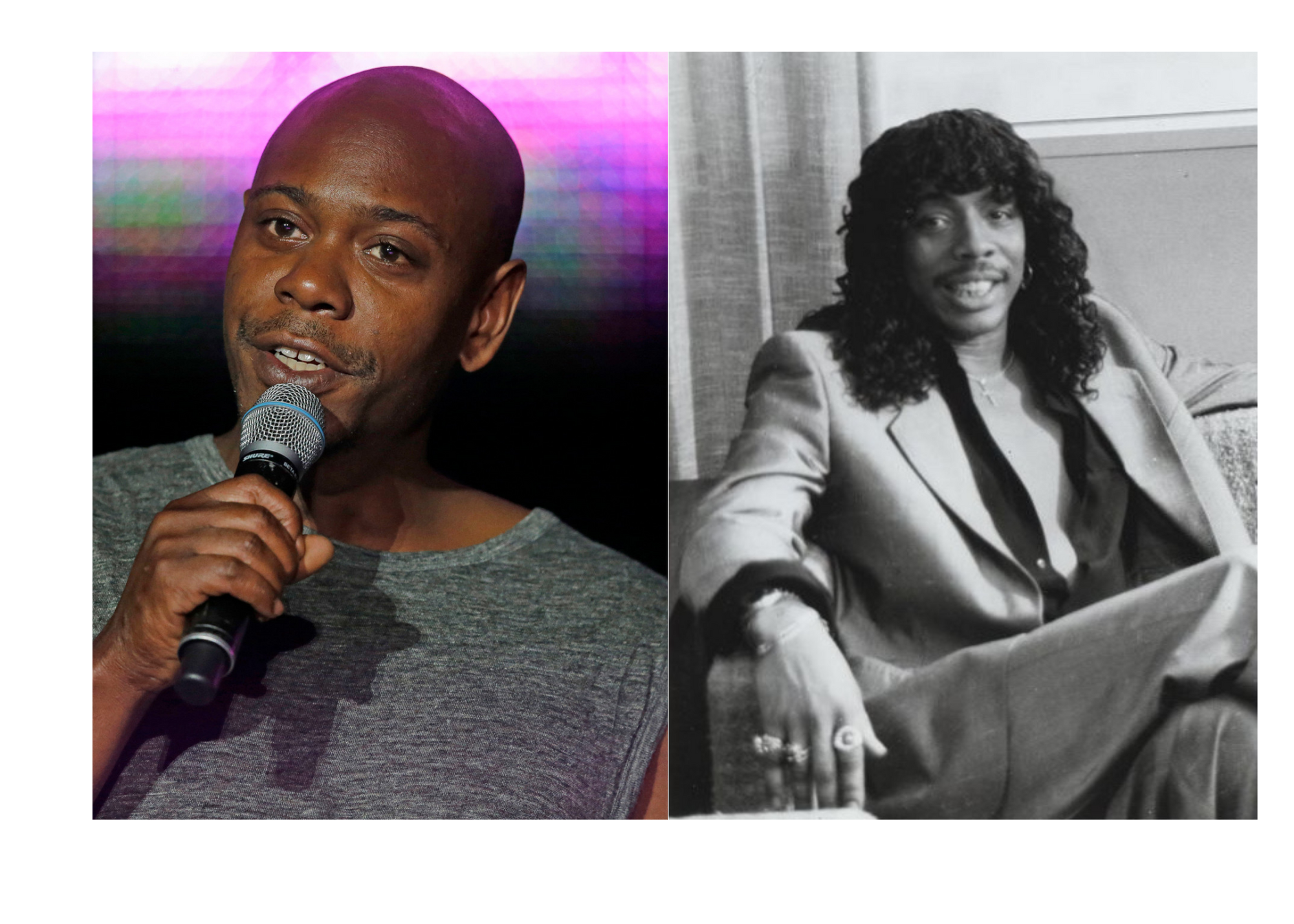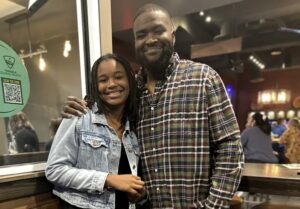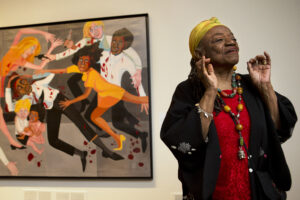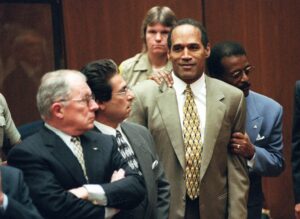“Bitchin’ – The Sound and Fury of Rick James”Directed by Sacha Jenkins (Showtime)
“The Closer”Featuring Dave Chappelle (Netflix)
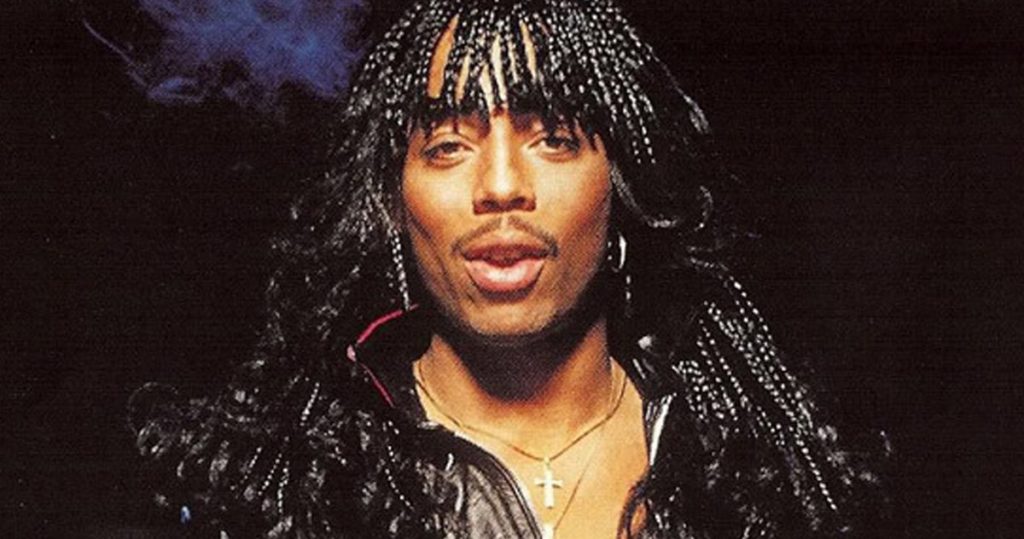
The late Rick James and comedian/writer/host Dave Chappelle are the subject of two recent, explosive and in the latter’s case extremely controversial productions now available on Showtime and Netflix respectively. The James documentary is a mixture of biography, analysis and reflection, spotlighting his life, background, and both musical and cultural impact.
The Chappelle special, the final outing fulfilling his recent Netflix contract, is much more a confrontational and combative presentation than a conventional stand-up special, though its look and set-up feature the usual lone comic performing in front of an admiring and exuberant audience, and the presence of a largely Black crowd figures into the highly polarized reaction that it’s engendered.
“Bitchin” takes the audience through a cradle to grave exploration of Rick James. James was a robust, dynamic figure, someone who early in life became immersed in vintage Black music idioms. Later he developed an original sound that merged the outrageousness of rock and punk with the improvisational edges and soulful fervor of jazz, blues, R&B and funk. He called the result “punk/funk,” and it turned him into a huge star.
But before that, James had his share of personal turmoil, which the film details. He was jailed multiple times before joining the military, and dealt with the fallout of being a survivor of sexual abuse. He moves from his Buffalo hometown to Canada, where he encounters Levon Helm, Robbie Robertson and others who would later become The Band. Subsequently, he formed the Mynah Birds with Nick St. Nicholas (who’d later join Steppenwolf) and Neil Young.
A distinctive artist
However James was too singular and distinctive an artist to be comfortable as a sideman in another band. His determination to persevere doing things his way, creating music unlike anyone else, is covered through the film’s middle and latter portions. James eventually triumphs as a vocalist, instrumentalist, producer and bandleader, a prolific type who also helps others like The Mary Jane Girls and Teena Marie score hits. While it would be inaccurate to not mention the influence of George Clinton and Parliament/Funkadelic in his sound, James’ hits had a singular and immediately identifiable sound.
From “You and I” to “Bustin’ Out of L7,” “Mary Jane,” “Give It To Me” and “Super Freak,” Rick James made extraordinary songs that were energetic and magical. Interestingly, when M.C. Hammer took “Super Freak’s” rhythm track and had the huge rap hit “Can’t Touch This” James was so appalled he passed the order that no other rappers could use his tracks.
Unfortunately, there were also personal problems that would ultimately cause James not only a fall from pop grace, but a stint in prison. Jenkins and the writing team make no attempt to sugarcoat either the problems he had or the mistakes that he made. His daughter Ty James speaks with great fondness about her father, and equal frankness about his sexual escapades and misadventures.
“Bitchin” neither obsesses on the negative or downplays the positives. Rick James fought MTV to get more exposure for Black artists, and his on-stage flamboyance and edge inspired generations of single performers and groups. It’s a comprehensive and important look at a vital, and still somewhat underrated artist.
Insightful comic
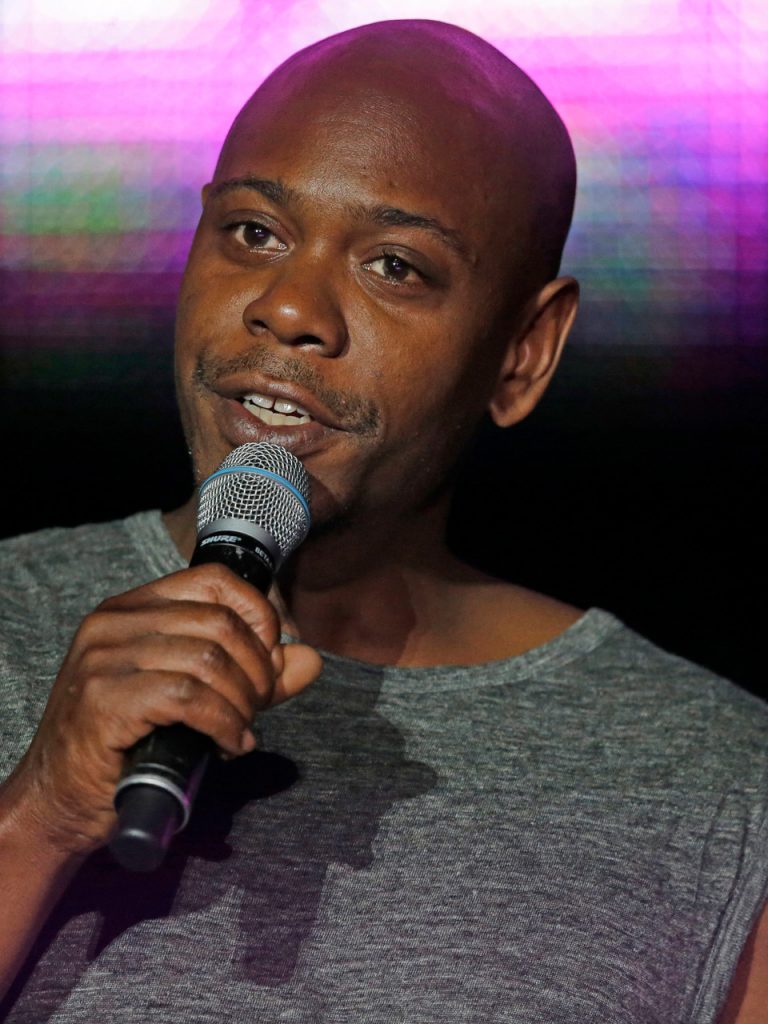
Dave Chappelle can be a searing, insightful comic observer and satirist. But he can also come across as mean-spirited and dismissive, charges that are frequently either being made directly or implied in the numerous critiques written in recent weeks about “The Closer.” After watching it, my prime regret is there are very serious issues being raised that are not getting nuanced, thoughtful discussion they deserve due to the animus that’s been spewed across social media, and because several (not all) of the critiques and reviews have been more personal attacks on Chappelle than serious analysis regarding the content of his material and observations.
From my vantage point, this is deliberately the least funny Chappelle special, because it’s much more about reaction and attempts at clarity than presenting a bunch of jokes, riffing on some aspect of life, or any of the usual things contained in a stand-up concert. That’s not to say Chappelle doesn’t say things that are humorous or tell jokes, because he does both. But his primary objective is trying to set the record straight from his point of view, saying to both the assembled audience and the millions (over 10 thus far) who are seeing it that he is NOT homophobic or transphobic.
Chappelle says midway through that he has “nothing against LGBTQ people, his problems are with white people.” He raises questions about racism in both LGBTQ and feminist circles, claiming at one point he’s “jealous of gay people” because they’ve made more progress in a relatively short period than Blacks in their entire time in America. On another occasion he expresses his admiration for older gays, the “Stonewall Gays,” whom he feels were tougher and more confrontational than the current crew.
These and other comments made throughout the 72-minute concert have not only ignited a firestorm, they’ve made serious discussion of the topics he’s raising more difficult. Black feminists and LGBTQ community members have been raising the issue of racial discrimination within their universe for decades. There are numerous books and articles available, and to be honest, Chappelle’s smart enough to know that. A significant portion of this concert is him deliberately inciting and agitating groups who have criticized him in the past. At one point he even says, “Oh. they’re going to be upset at me now.”
Free expression
I won’t make a judgment about Dave Chappelle is or isn’t in terms of character, but I will say that a lot of the comments sprinkled throughout “The Closer” don’t offer any insight into complicated issues of race, class and gender. They range from crude to harsh to offensive, and sometimes all three. Then there are moments where he calls for empathy, says he’s upset at seeing instances of anti-Asian actions by Blacks, and describes in very emotional fashion his friendship with a transexual comic who committed suicide, and mentions he’s established a trust fund for her daughter.
Comedians must be free to express themselves, but audiences also have the same right to respond and question those observations. I don’t support the notion of so-called “cancel culture.” However I do believe in accountability for what people say and do. Netflix CEOs have only made matters worse by tuning out, and in one instance firing, trans employees outraged by the Chappelle special, or discounting the impact words can have in terms of inciting negative and harmful actions towards marginalized audiences. Whether Chappelle’s comments will result in more Black trans women being harmed no one can say with certainty, but the possibility shouldn’t just be viewed as excessive paranoia.
If press reports are true, Dave Chappelle made well over $20 million for “The Closer.” He says near the end that he is done addressing the topics that consume four-fifths of the program. Time will tell whether that’s true, and whether any violent or tragic incidents result that get traced back to his special. My hope is in time the back and forth on social media ends, the various Chappelle attacks cease, and this society as a whole takes seriously ALL forms of oppression. Racism, sexism, homophobia, and transphobia infect this nation, and all are the byproduct of a power base fueled by white supremacy.
Hopefully, there can be general agreement. on that, and a consensus that everyone who opposes those ills must find a way to work together, and communicate with each other.

